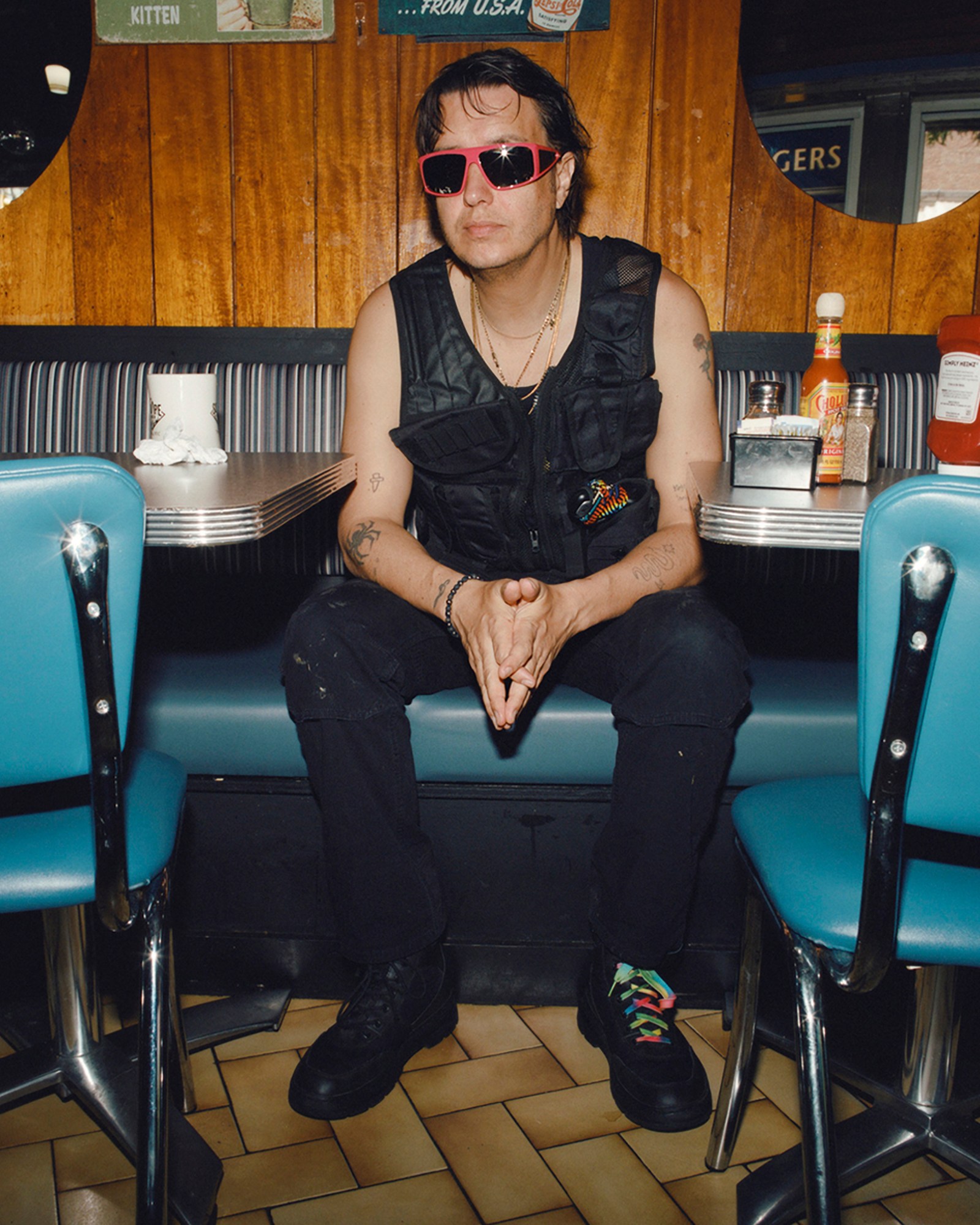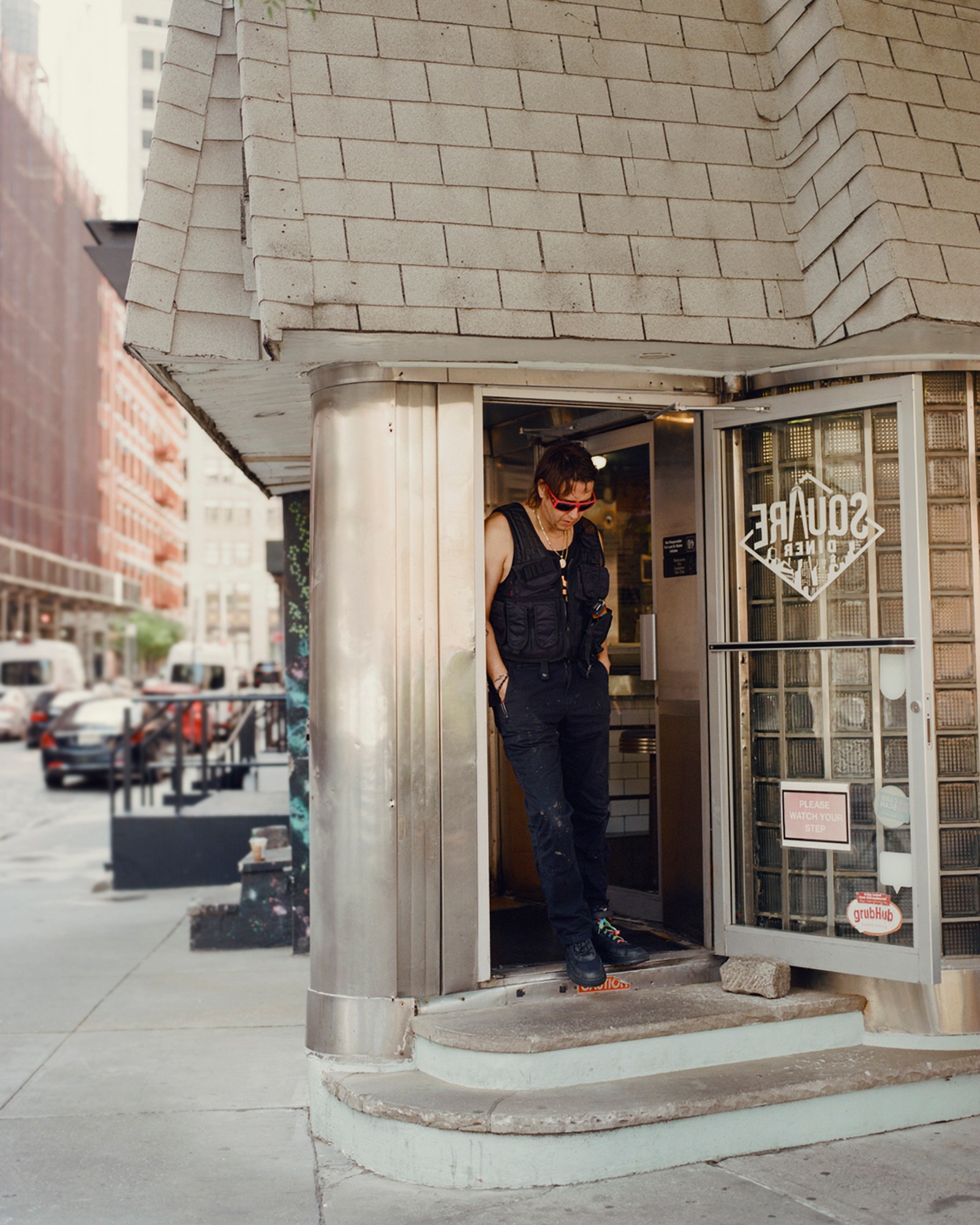August in New York, seven in the evening, sun still hanging in the sky. The saloon is called Clydesdale’s, he tells me. One of the girls from his team comes upstairs and she plugs her phone into a speaker. It’s like bargain bin Scott Joplin, I think. Maybe it actually is Scott Joplin. He is dressed like a pirate. I am dressed normally, for once. Despite what he says, we are not actually in a saloon. We are in the Ludlow Hotel, sitting at an absurdly long table in an otherwise empty bar. “It’s called Clydesdale’s Saloon,” he says again. “Ok, Julian,” I say to Julian (Casablancas.) I blink at Julian and Julian blinks at me. I ask something like: where were we. And he says something like: you tell me.
Julian Casablancas – you probably know him because he is a Stroke. They say his band saved New York from having bad music. Scion of Casablancas, John, who founded Elite Models. He released his first album with the Strokes, Is This It, a few weeks after 9/11, in 2001 at age 23. It was unambitious; it was also a revelation. The Strokes became synonymous with New York in the same way that the Velvet Underground is synonymous with New York. They are not as good as the Velvet Underground, but they are still really good. The kind of music you want to play while kissing someone. The kind of music you want to play walking around your apartment in your underwear on New Year’s Day. The kind of music you want to listen to while sprinting across the Manhattan Bridge in a little skirt. The band released five more albums, all varying in quality but all containing at least one perfect song.
Julian noodled around on the side, releasing his first solo record, Phrazes for the Young, in 2009. Shortly after, he started the Voidz, which is not really a solo project, but is definitely Julian’s project nonetheless. The band released their first record together, Tyranny in 2014, followed by Virtue, in 2018. When we speak, it is because Julian, now 46, is getting ready to release the Voidz’s third album, Like All Before You. We hardly talk about it at all.
Instead, we just sit there, staring at each other across the table in the Ludlow Hotel. This is a place Julian knows really well because he lived there for part of the pandemic. When we enter the bar after an aborted attempt to talk in the lobby for five minutes (too loud with background chatter, also they are playing the awful song “Shuggy” by Foxygen), he immediately loosens up. He turns the bar into Clydesdale’s Saloon.
Julian grabs my iPhone 11 from across the table and says: be careful, they’re listening.
At 46, Julian is still boyish. His hair is still in that little art school shag. He is wearing a strange outfit, but in a disarming way. In a: you can’t actually be scared to talk to this man because he is dressed like a pirate? kind of way. He is also boyish in a letting you know when you have asked a stupid question way. When we start talking he is openly hostile and guarded and is ribbing me at all once. He is quick to tell me that I have misread what his record is about, and this is how we enter the domain of conversation.
Like All Before You is an album that is littered with fantastical allusions. Wizards, vampires, being dragged to hell by seven (seven!) horses. Dragons and Heaven’s Gate, the cult. It is gritty and a little bit experimental— like if you were to take a Strokes song and run it through a Skyrim filter. Is it about conspiracy theories, I ask? Did you write this to the tune of Ancient Aliens reruns? “It’s hard to say where my head was at,” he says, “I wrote the record over the course of seven years.”
“Ancient Aliens — it’s basically Scientology,” he continues. “This is unrelated to the lyrics but I’ve been thinking a lot about ancient Sumerian culture. Sumerian culture is the first modern culture. They had accounting and were very advanced on all fronts. People think that because they were advanced and they drew drawings of large people that they were made by aliens, which is stupid. Just because white people didn’t build it doesn’t mean it was built by aliens.”












What really interests Julian these days, he says, leaning back into his chair, isn’t ancient Sumer. It is a little something he calls the Real Life Contemporary Conspiracy Theory. “There’s enough real conspiracies that are not even arguable factually, that are just kind of in plain sight, that just don’t get attention,” he says, “It is hard to talk about in the modern media sphere. People are going to bounce the propaganda of the day off of their mind. You want to talk about elections and democracy being stolen in plain sight? There’s a lot of evidence and it’s not disputable.”
I don’t stop him to ask what he means by this. So I let him continue: “Bernie probably would’ve won the election if it wasn’t stolen. Iowa was full-on rigged. They released the results because Bernie had won and the DNC already had their favorite. It’s not a conspiracy. That’s the thing.”
I am not surprised by any of this. He is known for being outspoken about politics and I have a little bit of a handle on what those politics are, materially. Julian is a political autodidact. Someone who reads about politics constantly and engages in politics constantly. He is someone who jokes that being a musician is a “day job.”
“I’ve always been political,” he says. “The older I get and acquire the relevant information, the more I feel equipped to talk about it.” To date, Julian has publicly endorsed two candidates. Bernie Sanders, which goes without saying, and Maya Wiley, a progressive democrat who ran for mayor of New York City. He doesn’t really adhere to any political label. He is definitely some sort of leftist. He hates mainstream politicians, referring to the two party system as “Exxon versus Citibank,” and says he likes politicians only if “they’re not bribed.”
The same goes for where he gets his news. “Net Neutrality changed everything,” he says, citing the RT as one of his main sources of news before it was taken off YouTube. “The show would have Noam Chomsky, Chris Hedges, Jesse Ventura. It would talk about Black Lives Matter and healthcare. It was all deleted because of the war against Russia.” Then he makes the mistake of telling me that there are some people who he follows that he cannot even mention because they are so controversial. “Like Russell Brand,” he says, “The Christian thing he is doing is weird but he was very vocal about things that were going on.”
When I tell him – grossly oversimplifying things – that Brand has gotten a little crazy in recent years, he doubles down. “That sounds like New York Times headlines,” he says, “What are you talking about, exactly?” I mention Brand’s assault allegations. “Most of his allegations were sexual harassment,” Julian says. “One of them was assault. One of them was that he forced them to give him a blow job in the bathroom. I would like to see it unfold in court. If he did something, I’d be the first to say he should definitely suffer the consequences, but it seems way more organised outside than real to me personally.”

Then we spent the next little bit talking about whether or not AI is good or bad and how Julian wants to go to Malaysia, maybe with me. We talk about books and I ask him what he is reading and, in an accusatory tone of voice, he asks me well what are you reading, as if to say, I bet you’re not reading anything. I pull a copy of 2666 out of my purse and he tells me the cover is awesome. I tell him I think he might like the writing of Vincent Bevins. He tells me if he had a time machine he would go back 80,000 years into the past to see early humans separating from the monkey tribes. I tell him I’m not worried about AI because AI has never fallen off its bicycle and cried.
Julian grabs my iPhone 11 from across the table and says: be careful, they’re listening. This gives me whiplash, because we had just spent the last 40 minutes having an extremely tense conversation about politics, and now Julian is being so charming. We are eating some nuts and he asks me if, like the perfectly roasted nuts, I will perfectly roast him. I say: I don’t know, Julian. I tell him he is both a rock star and a political pundit. He says that he doesn’t know what a rock star is. I say it is an empty signifier, ha ha. He says that’s a cool two word phrase. He says: that’s the title of the article. He says: that’s my new Instagram bio. He brings up Malaysia again and says I should go there with him because there’s a cave and that’s where language is from. He tells me to make sure I get his number from his publicist. Because of Malaysia.
Like All Before You is out September 20
Text: Sophie Kemp
Photography: Tom Fletcher
